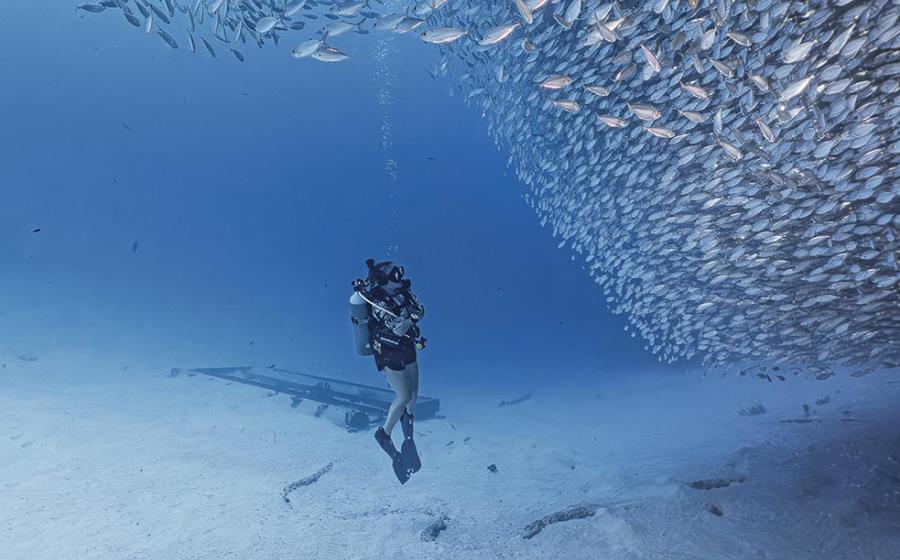Six Ways to Save Money for Scuba Travel

Shutterstock.com/Marie MaerzGroup trips, off season dates, separate savings accounts and more can turn your dive dreams into scuba memories.
The ocean is free, but dive travel? That’s a different story. Add up international flights, gear rentals and a hotel, toss in a few beach cocktails, and your getaway can start to get away from you.
Here are some ways to maximize your resources so you can immerse yourself in water, not interest rates.
1. Create a monthly budget, then track it
Don’t think of budgets as roadblocks between you and having fun. Quite the opposite — they’re actually a road map to how your money is going to get you where you want to go. If you plan ahead, designating a specific amount of money from your budget for dive travel, you ensure you are consistently working toward those long-term travel goals.
Tracking how well you're sticking to your budget is key. A written record of where your money is going over time lets you see if you’re executing your plan. A map is no good if you don’t follow it! There are tons of free apps out there to help you track your spending, like EveryDollar or PocketGuard.
This record also makes it easier to identify ways you can tweak your spending over time to better align with your goals. Perhaps you have a Netflix, Hulu, and Disney+ account? You can probably get by fine with one. Maybe you’ll see that you squander too much on eating out. The little things add up!
Here’s a real-life example: At work, you have a Starbucks latte twice a week at $5.00 each. Plus, you go out for lunch three times at $10 each. This averages $40 on dining out weekly. If you do this all year along, that’s $2,000 ($40 x 52 weeks)! Enough for a holiday in Cozumel.
Keep an eye on your budget and cut back and slash where you can. You won’t remember those missed coffees when you’re diving on a reef alongside a turtle.
2. Set up a separate savings account
Take that monthly dive budget and stick it in a different account from your everyday checking account. Having the money in a separate bucket helps keep you from dipping into it for general spending, and allows you to see what you’ve saved at a glance. It’s incredibly rewarding to watch that number grow, keeping you motivated to continue saving.
3. Start a side hustle
A little extra money can go a long way. Great at carpentry or photography? Maybe you’re a blogging pro? These days, the gig economy offers endless routes to earn extra income outside your regular 9 to 5. A side hustle can earn anywhere from a couple of dollars to a couple of thousand dollars a month. This can be a game-changer.
Here are some ideas to get you started. Whatever you do, stay motivated and remember your savings goals.
- Work part-time at your local dive shop
- Teach an online course or in-person class
- Become a virtual assistant
- Offer home maintenance services
- Sell your photography or editing skills
- Offer pet sitting or dog walking services
4. Make money work for you
Consider ways you can make your bank work for you to prioritize savings. For instance, when you setup your new scuba fund, consider the sort of account you open. A high interest savings account will gain interest over time, and an auto-deposit plan will move money directly to dive savings on a pre-determined schedule. Some banks also have a ‘simply savings’ feature that will round up every debit transaction to the nearest dollar. The bank then deposits the extra coins into your savings account. This can grow your savings in a shorter period of time.
5. Shop smart
You can always shop more economically. Opt-in for bargain shopping, buying in bulk, capitalizing on store points, clipping coupons, and searching for discounts online. There are endless ways to save, and as mentioned before, the little things add up.
Being frugal with your spending is also not just a habit for the home. It applies when going on dive trips too. If you can be flexible on dates, destinations, or seasons you will be able to find a fantastic holiday for much less. Start by shopping the sale tab on the company’s website. Then compare competitors, join mailing lists, review Scuba Diving’s current dive deals — it can take some hustle, but it’s worth it to stretch your dollars.
6. Unite with other divers
When it’s finally time to book your trip, consider traveling with a group. Group dive holidays will help your hard-earned savings go much further. The tour leader will work to find the best deals and incentives to pass onto the group. You will be able to divide major trip expenses, like housing, dining, and diving. Plus, you could also save on smaller costs by sharing taxis, splitting excursion fees, and even avoiding that pesky single supplement on liveaboards. Great scuba experiences always come back to good dive buddies!
Tracking a budget, slashing costs, and becoming a smart shopper isn’t about cutting all the fun out of your life. It’s about prioritizing and balancing your spending so you can enjoy that epic dive trip you’ve been dreaming of as well. The key is to start saving then keep saving. Stay motivated and consistent. Remember this is not a race. If you need to save up for that dream dive trip over several years, that’s okay! Coral reefs grow slowly, but that does not make them any less wonderful.
Related
- Five Best Scuba Diving Destinations for Budget Travel
- How to Save on Scuba Equipment
- 20 Ways to Make Your Dive Travel More Environmentally Friendly










